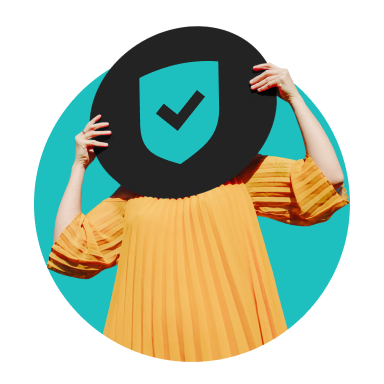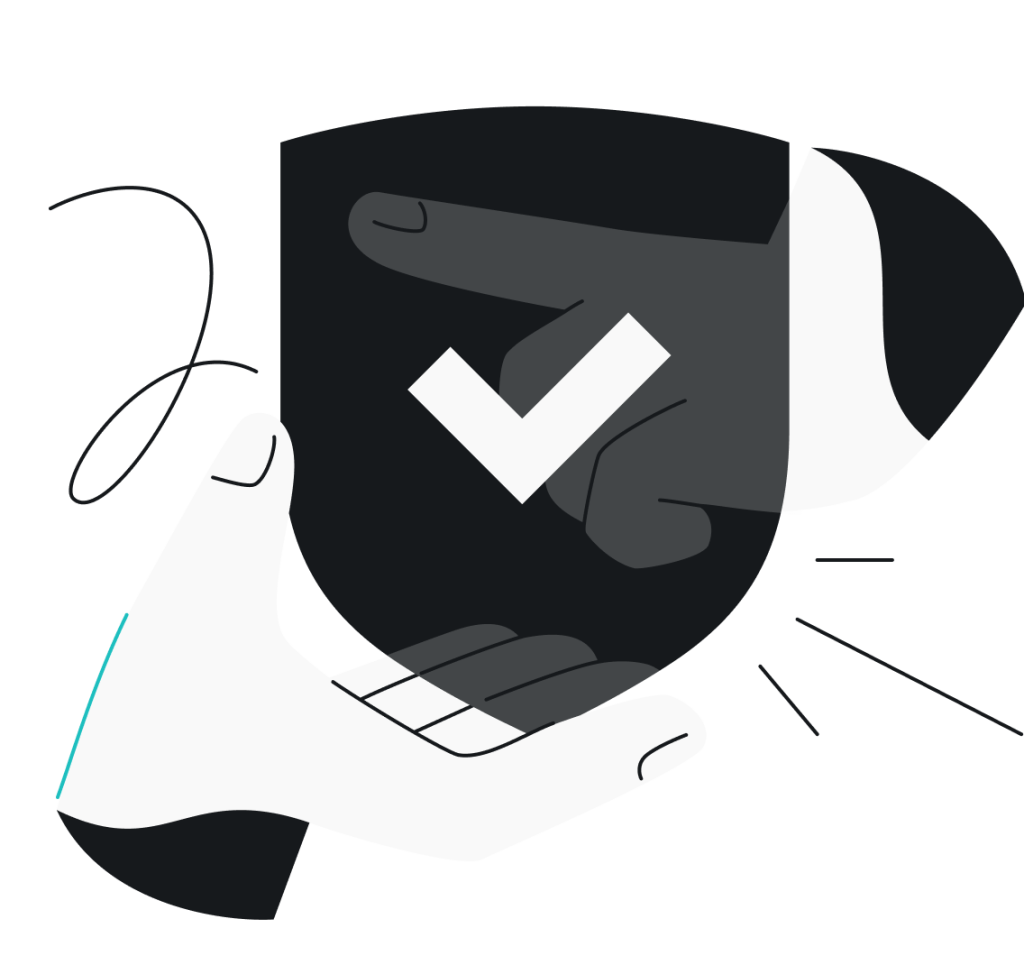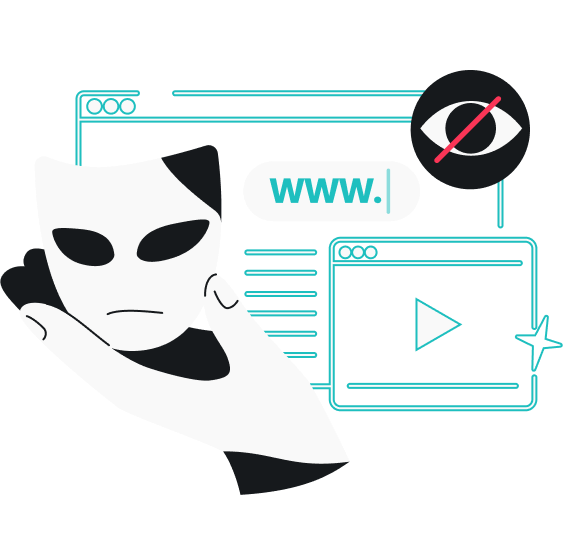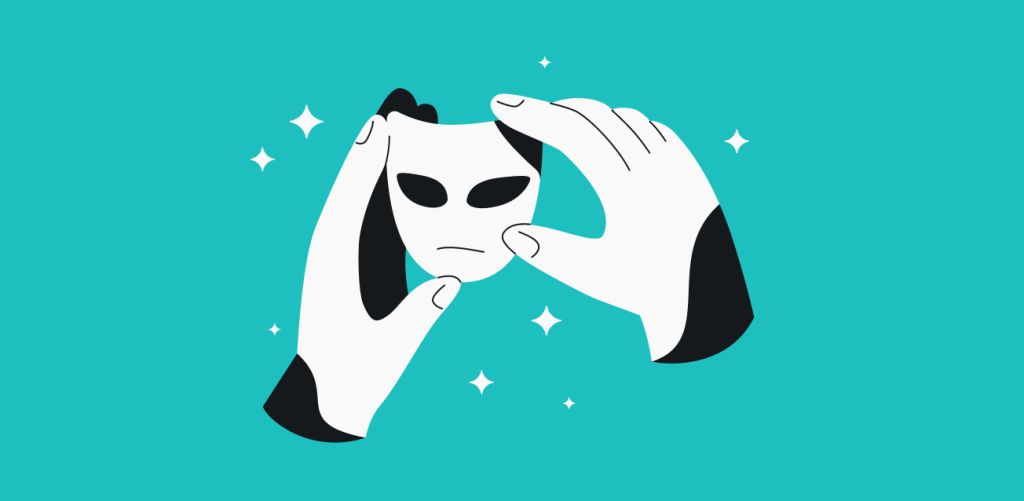Some brave souls might not mind sharing every detail of their lives online on platforms like Instagram or TikTok (hang in there, US users).
That said, countless others prefer to remain nameless on the web, turning to tools like a VPN (Virtual Private Network) to mask their identity.
Is total anonymity possible online? And can VPNs help? Let’s get right into it.
In short: does a VPN make you anonymous?
While a VPN won’t make you anonymous, it’s an essential tool for users seeking some degree of privacy online. That’s because a VPN does the following:
- Masks your IP (Internet Protocol) address: a VPN changes your virtual location, and your real IP address stays hidden. This prevents third parties from seeing where you’re accessing the web from. So, when you connect to a server located in another country like France, your IP address is French, leaving your ISP (Internet Service Provider) and the site you’re visiting to believe that you’re in France;
- Encrypts your internet traffic: a VPN creates an encrypted tunnel from your device (e.g., a computer or smartphone) to your online destination (e.g., YouTube). Robust encryption prevents anyone from seeing what you’re doing online. If any snoop comes around, they’ll just see scrambled, indecipherable signals that won’t tell them much about you.
Together, IP masking and strong encryption form a dynamic duo. They’re the reasons VPNs can protect users from tracking, ISP snooping, hacking attempts, targeted advertising, and internet censorship.
How is privacy different from anonymity?
Digital privacy and anonymity seem to go hand in hand, but being private isn’t the same as staying anonymous.
The two words themselves aren’t even the same when you think about it. You might not know much about a private person, but you still know they exist. However, when someone’s anonymous, their very existence is a secret.
The same difference exists in cyberspace. Being private on the internet is an achievable goal. You can hide your online activity, protect your personal data, and remove all kinds of digital identifiers from the sites you visit.
What if you want to stay anonymous online?
Hiding completely from others might only be possible if you’ve never been on the internet at all. Whether it’s advanced government surveillance techniques or something as simple as human error (I’m not the only one who’s overshared on social media, am I?), surfing the web without leaving any digital footprint is becoming exceedingly difficult.
So, even though a private VPN boosts your online safety, it won’t make you completely anonymous.
What is online anonymity, and is it possible?
True online anonymity involves hiding everything you do online from others. Technologically and practically speaking, this is nearly impossible — and definitely impractical.
Why? Consider the following questions:
Does your email address have your name in it?
Is your real name present anywhere on social media?
Did you ever buy anything online?
If you answered yes to these questions, you’re miles away from anonymity. Your email address and social media already give up your name (if not more), and online purchases reveal details like your address or bank account credentials.
And none of this takes into account your IP address, which gets recorded every time you access the web. Among other things, your IP shows your geographic location, ISP, and device type, but this info can thankfully be masked with a VPN.
Here are some quick answers to the main questions about anonymity online:
| Question | Answer |
|---|---|
| Why is an anonymous VPN needed? | A VPN is needed to encrypt your internet traffic and mask your IP address if you want to enhance your privacy and security online. |
| Can you be tracked using a VPN? | A VPN does a lot to make you harder to track, but it’s not impossible. |
| Can you stay anonymous on mobile? | You can be a lot more private if you use a mobile VPN and follow common-sense safety steps, but you still won’t be completely anonymous. |
| Is a truly anonymous VPN possible? | No, absolute anonymity is impossible to achieve online. |
| Do I need privacy measures besides a VPN? | Yes. For extra privacy, don’t share payment details online, avoid public Wi-Fi when possible, and use alternate emails and phone numbers. |
| How is privacy different from anonymity? | Privacy means keeping what you do online secret. Anonymity means keeping your identity, not just what you do, hidden. |
Why do you need an anonymous VPN?
None of us are completely anonymous online, and our privacy is always at risk. The amount of private data that gets stored depends a lot on your internet habits, but one thing is clear — you should use a VPN to improve your online privacy.
A VPN can help in the following ways:
| Without a VPN | With a VPN |
|---|---|
| Your real IP address is logged wherever you go | The VPN server’s IP address is logged wherever you go |
| Your data isn’t encrypted | Your data is encrypted |
| Your real IP address reveals your actual location | The VPN server’s IP address reveals the VPN server’s location |
Furthermore, a VPN service can help you combat these top online anonymity threats:
Public Wi-Fi networks
Unsecured public Wi-Fi networks are hotspots for hackers and others interested in seeing what you’re up to online. Prying eyes can monitor your activity, intercept your data, and steal your passwords.
With an encrypted VPN connection, it’s much more difficult for anyone on the same public Wi-Fi network to access your information.
Government surveillance
Especially in oppressive regimes, government agencies often collect data about individuals’ communications to censor or block internet access. Secure encryption from a private VPN makes it much more difficult for intrusive surveillance programs to trace your online actions back to you.
Search engines
Popular search engines like Google or Bing track your preferences, search history, and browsing habits to build detailed profiles for targeted ads. And don’t be fooled by a browser’s stealth mode — like Chrome’s Incognito. This won’t hide your IP address or prevent websites from tracking your activity.
For enhanced privacy, you’ll need a VPN to mask your location and stop search engines from linking your searches with your true identity. Privacy-oriented search engines like Surfshark Search are also excellent tools that offer purely organic results free from ads or tracking.
Data leaks
Websites and apps often store personal information that can be exposed during data breaches, leaving your details vulnerable to hackers. A VPN can’t stop breaches, but using one will mitigate your risks should your data ever be compromised. With encrypted traffic and a masked IP, the chances of your real data getting intercepted are significantly reduced.
Internet Service Providers
ISPs can monitor your browsing history and sell your data to advertisers. A VPN with a no-logs policy routes all your data through a secure server, ensuring your ISP can’t see what websites you visit or what you do online.
Can you get a truly anonymous VPN?
No, a truly anonymous VPN is impossible — or near impossible — to find. However, major players in the VPN market, like Surfshark, put in a lot of effort to make you as private as possible.
Look for solutions that offer alternative payment options, like paying in crypto, to help keep your banking details private. On top of this, seek out RAM-only servers, as these lose any data going through them if they’re ever seized. And always be on the lookout for a provider with a verified no-logs policy backed by independent audits. This ensures they don’t keep any logs linking to your online activities.
Can you use a free anonymous VPN?
No, a free VPN won’t make you anonymous online. Free VPNs are barely better than having no VPN at all.
Why? For one, free tools usually have unclear privacy policies. Many free VPN services sell user data to advertisers or third parties, so your privacy often isn’t their top priority.
In addition, users tend to get bombarded with ads. Free VPN providers frequently turn to advertising to make a profit. Not only can these ads be irritating, but they typically slow down your device and eat up precious mobile data.
If in doubt, paid VPNs are the safer, more effective choice. These don’t track or collect your browsing activities, and comprehensive solutions like Surfshark even offer ad and tracker blockers to clean up your online experience.
Is Surfshark an anonymous VPN?
Achieving absolute anonymity online is nearly impossible on any internet connection, but Surfshark takes you as close as you can get. With fast servers, increased user privacy, and enhanced online security, Surfshark lets you browse the web without looking over your shoulder.
No VPN can guarantee complete anonymity, but Surfshark comes packed with advanced features designed to keep your information as private as possible. Here’s how Surfshark takes your privacy to the next level:
- Robust encryption: Surfshark protects your data with modern encryption protocols that allow for greater speed and security;
- DNS (Domain Name System) leak protection: with Surfshark, you won’t have to worry about your IP address slipping through the cracks. Your traffic stays within our secure DNS servers, keeping your identity safe from prying eyes;
- No-logs policy: Surfshark doesn’t track what you’re doing online. With a verified no-logs policy, we don’t store any of the data from your browsing sessions;
- Kill Switch: our Kill Switch keeps your data safe if your VPN connection drops unexpectedly. Your IP address will even stay private at all times;
- Camouflage Mode: Camouflage Mode is our stealth feature that makes your VPN traffic look like regular browsing. Even your ISP doesn’t know you’re using a VPN;
- Cryptocurrency payments: crypto adds that extra layer of privacy to your internet connection. Pay with it for your Surfshark subscription to avoid having to share any personal banking info.
Aside from using a VPN, what else can you do to stay private online?
While you likely can’t be 100% anonymous online, tools like a VPN can help protect your data. Here’s what else you can do:
Use a private search engine
Google may be convenient, but every search gives sites and advertisers more information about you. Private search engines like Surfshark Search don’t track or profile users, so every visitor sees the same search results.
Routing your internet traffic through VPN servers while using a private search engine offers even more privacy, so consider a VPN service like Surfshark that bundles these tools together.
Remember your device’s privacy settings
By tinkering with your privacy settings, you can control which apps can access your location, contacts, messages, camera, photos, or even health information. Don’t blindly install apps without first checking what info they have permission to see. When an app asks to access something like your messages, carefully assess whether sharing this info is needed.
Check your accounts for leaks
With all your accounts across the internet, there’s a good chance at least one has already been compromised. After all, cybersecurity experts recommend resetting your passwords every three months for a reason.
Never fear — tools like Surfshark Alert notify you whenever any of your data has leaked online and prompt you to take corrective action. Securing your accounts with leak protection is a proactive step you can take to maintain your privacy on the internet.
Generate an alternative identity
Masking your email address can greatly improve control over your personal information online. Surfshark’s alternative email feature lets you generate alias email addresses that help protect your identity and keep your online activities separate. Since the service forwards all messages to your primary inbox, filtering and isolating them is easier, and so is identifying any phishing and scamming attempts you might encounter.
Alternative email is part of Alternative ID, a Surfshark product available with all our subscription plans. It lets you create an online persona, complete with a fictional email, name, birth date, and address.
Alternative ID provides four advantages:
- Simplified privacy: you communicate without exposing your real email, name, birth date, or address;
- Reduced data exposure: helps you limit how much personal information reaches online forms, marketing lists, and third-party databases;
- Convenience: seamlessly integrates with Surfshark’s VPN (Virtual Private Network) and Antivirus products — no separate logins or extra passwords required;
- All-in-one protection: included with every Surfshark subscription at no extra cost.
Bottom line: a reliable VPN service is your first step to online privacy
Let’s face it — an anonymous VPN doesn’t exist. That said, the best VPN for privacy can still offer invaluable defense from hacking, ISP monitoring, data collection, and more. Whatever online activity you’re conducting, protect yourself from prying eyes with a secure VPN connection today.
FAQ
Can I be anonymous with a VPN?
No. Although a VPN is an essential cybersecurity tool that will make you more private online, it will never make you 100% anonymous. Nothing will (except maybe faking your death, changing your name, and moving to live alone in the woods).
Which VPN is the most private?
When looking for an anonymous VPN, your best bet is a VPN that won’t collect your data. Although there’s no right answer, there are definitely some wrong answers — avoid free VPNs and any VPNs with sketchy privacy policies.
What’s the best anonymous VPN?
There’s no such thing as a totally anonymous VPN, so no tool can claim to be the best anonymous VPN. However, users looking to protect their privacy can turn to a no-logs VPN with fast servers, strong encryption, and advanced privacy features like a kill switch and DNS leak protection.
Can a VPN keep you anonymous online?
No, a completely anonymous VPN doesn’t exist. A VPN won’t let you stay anonymous online — nothing will. However, a VPN with advanced privacy features elevates your online security while protecting your online activity.
Do VPNs really hide your identity?
A VPN helps you hide your identity. However, there are many ways in which you can reveal your identity yourself despite VPN protection. That’s why you should follow some basic guidelines, like not posting your full name and address unnecessarily.
How do I pay for a VPN anonymously?
While you won’t find a truly anonymous VPN, most major VPN platforms let you pay through non-traditional methods that give users an extra layer of privacy. For instance, Surfshark accepts bitcoin and cryptocurrency payments, so you can subscribe without revealing your banking or credit card details.
Are VPNs traceable?
There are ways to identify that a VPN is in use. For websites and services, it relies on checking whether the connections are coming from the IP address of a known VPN server. Meanwhile, ISPs can detect that a VPN is in use by looking at the patterns in your internet traffic.
Can you stay anonymous on mobile?
Online anonymity doesn’t really exist, and it’s even trickier with phones. You may share your computer with others, like family members, but your phone is more likely than not tied directly to you and only you. To achieve maximum anonymity with a phone, you’d need to buy a burner phone with a pay-as-you-go SIM card and pay for everything in cash.
A more realistic option would be staying private with a reliable VPN when connecting to the internet. You’d need to make sure you’re using a VPN with a no-logs policy that doesn’t track or collect what you do online. This means you’d have to choose a paid VPN instead of a free VPN.
Can you be tracked if you’re using a VPN?
No, you can’t be tracked if you’re using a VPN because all the data related to your internet traffic is encrypted. Your ISP and any bad actors aren’t able to intercept any of your information — they only see the VPN server’s IP address.





